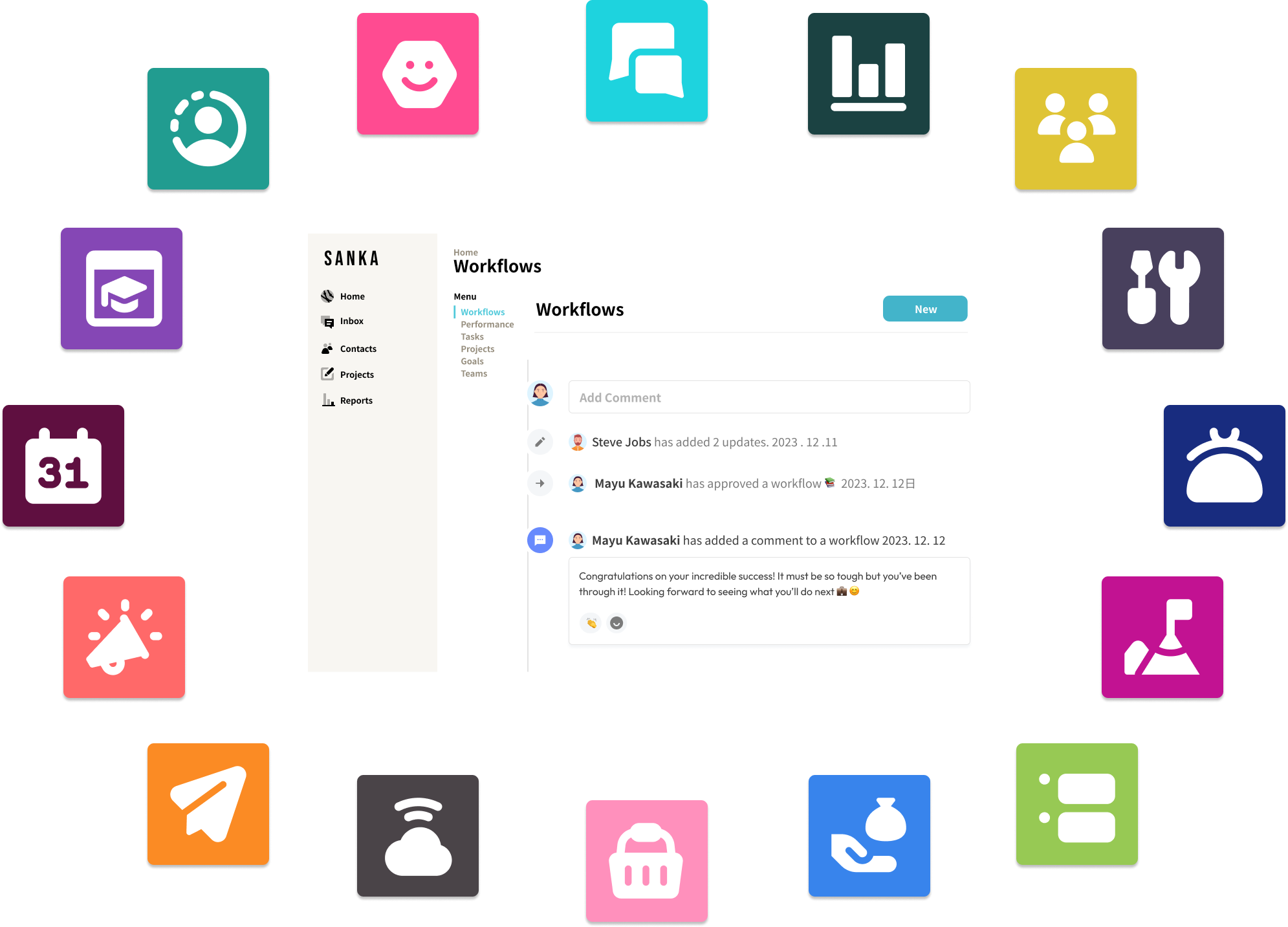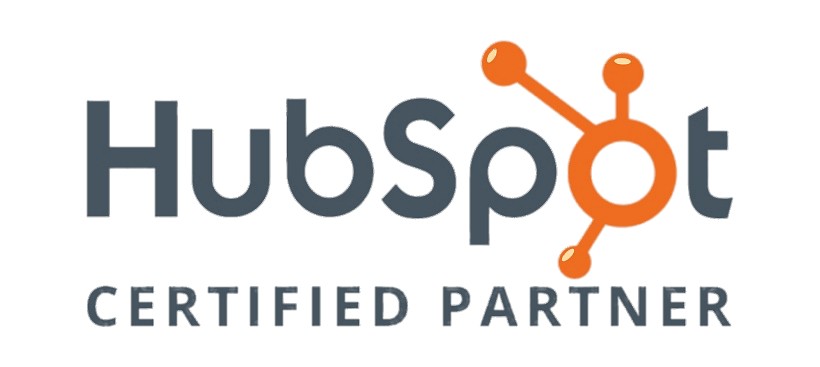What you will get from this article:
- Understand What Is Automation and Why Is It Important?
- Discover the Top Benefits of Automation for Businesses
- Explore the Examples of Automation Across Industries
- Explore the Automation Trends and Technologies
- Learn about How Sanka Helps Businesses Automate Key Processes
Introduction
Have you ever wondered why companies are investing so heavily in automation?
As technology continues to advance at breakneck speed, automation is becoming an increasingly important tool for businesses to leverage.
Whether you realize it or not, automation is transforming businesses and changing the way we work. It's making companies more efficient, productive, and innovative.
From the moment your alarm wakes you up, to the moment you stream your favorite TV show before bed, automation is working behind the scenes to make things faster, cheaper, and more efficient.
Automation is the use of technology to perform tasks that were previously done by humans.
Things like controlling machinery, handling repetitive production tasks, and streamlining business processes.
While the idea of automation may stir up fears about job losses, the reality is that it will likely create new types of jobs even as it eliminates others.
The key is understanding how to work with automation, not against it.
Automation is happening whether we like it or not, so we all need to embrace it and discover ways to thrive in this new era of technological advancement.
What Is Automation and Why Is It Important?
Automation refers to the use of technology to perform tasks that once required human labor. As AI and robotics continue to advance, more and more jobs are becoming automated.
Why You Need It
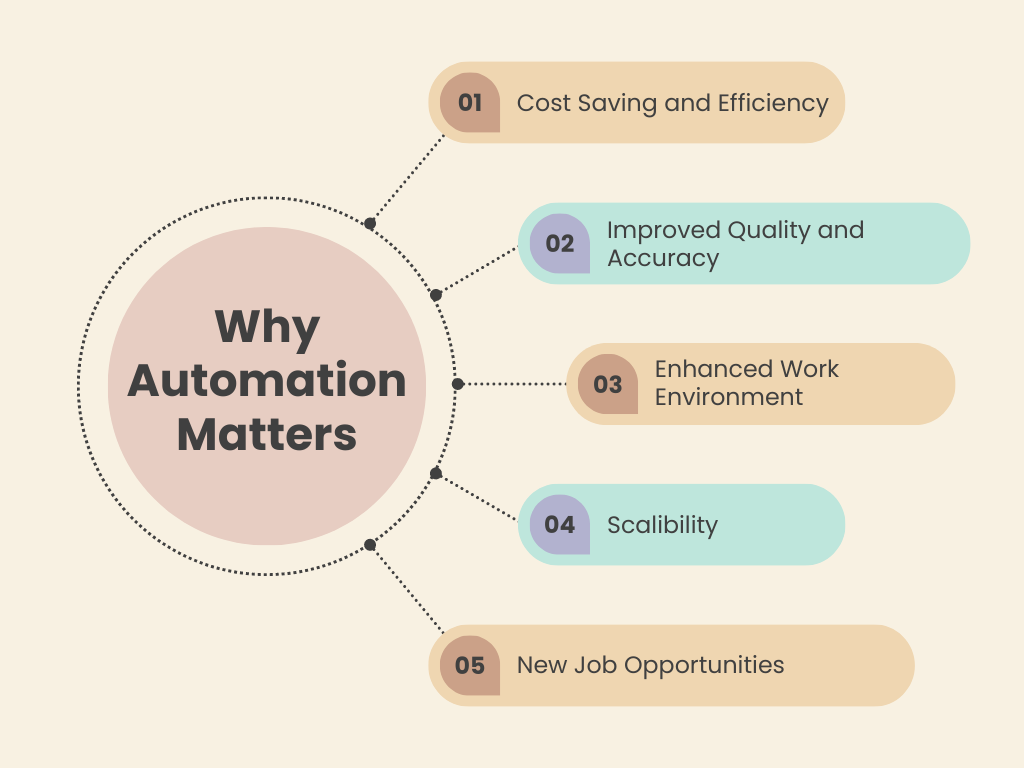
Top Benefits of Automation for Businesses
Automating parts of your business just makes sense these days. Not only does it save you time and money, but it helps you scale and keep up with larger competitors.
Increased Efficiency and Productivity
Automation reduces the reliance on manual labor, allowing tasks to be completed faster and more consistently.
Automated systems complete tasks faster and more accurately than humans. They don't get distracted or bored or tired. This results in higher output and quality.
According to Deloitte Global Survey, automation can reduce data entry errors by up to 90%!
Enhanced Accuracy
Human errors are inevitable, but automation minimizes them. Automated systems follow predefined instructions meticulously, resulting in highly accurate outcomes.
Industries such as pharmaceuticals and electronics manufacturing benefit greatly from this level of precision, ensuring products meet stringent quality standards.
Improved Safety
Dangerous and repetitive tasks can put human workers at risk. Automation takes over these tasks, reducing the potential for accidents and injuries. In industries like mining and construction, automation enables remote operation of machinery in hazardous environments.
Cost Savings
While initial setup costs for automation can be significant, the long-term savings are substantial.
By handling repetitive tasks, automation decreases the number of hours employees spend on mundane work.
Automation reduces labor costs, minimizes waste, and optimizes resource utilization.
Over time, businesses experience a higher return on investment due to reduced operational expenses.
Consistency in Quality
Automated systems adhere to consistent processes, resulting in uniform product quality.
This is crucial in industries like food production, where deviations in quality can have serious consequences.
Automation ensures that products meet customer expectations every time.
Scalability
As your business grows, repetitive tasks also increase. Automation helps manage higher workloads without needing a proportional increase in staff.
It gives small companies the ability to scale like large enterprises.
Rather than hiring and training additional personnel, automated systems can be scaled up to handle higher workloads efficiently.
This scalability is particularly beneficial in industries with fluctuating demands.
Faster Time-to-Market
In industries with rapid product development cycles, automation accelerates the production process.
Automated design, testing, and manufacturing workflows cut down on time-to-market, allowing businesses to stay competitive in fast-paced markets.
Data-driven Insights
Automation generates vast amounts of data that can be analyzed to gain valuable insights.
These insights inform decision-making, process optimization, and predictive maintenance.
Data-driven automation empowers businesses to make informed strategic choices.
Enhanced Customer Experience
Automated chatbots, voice assistants, and other AI-based systems provide quick, convenient service for customers.
They can handle basic questions and requests 24/7. This results in higher satisfaction and loyalty.
Automation streamlines various customer-facing processes, leading to a more efficient and personalized customer experience.
Focus on Innovation and Creativity
Automation frees up human workers from mundane and repetitive tasks, enabling them to focus on higher-value activities such as innovation and creativity.
With automation handling routine tasks, employees can dedicate their energy to problem-solving and strategic thinking.
Examples of Automation Across Industries
Automation is transforming industries across the board. Here are a few examples of how automation is being applied:
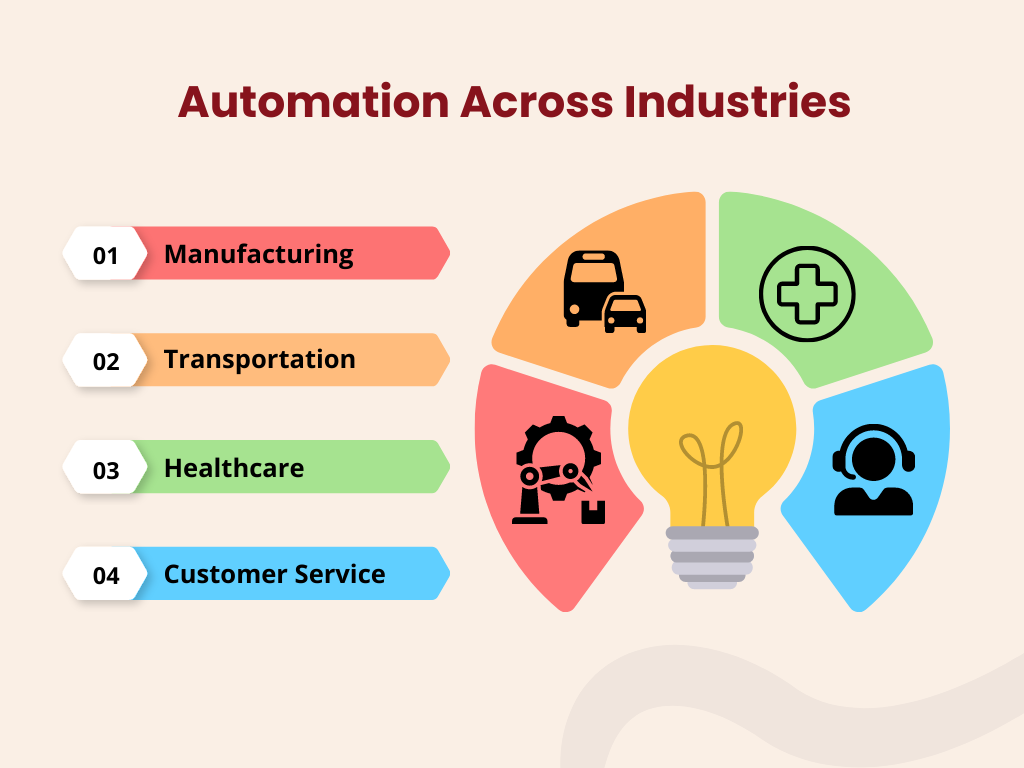
Manufacturing
Manufacturing has benefited greatly from automation. Assembly lines now commonly use robotic arms to precisely assemble components.
Automated conveyor belts efficiently move products between workstations. Vision systems inspect products for defects.
All of these automated processes have increased productivity, improved quality, and reduced costs.
Transportation
Self-driving vehicles are an exciting example of automation in the transportation industry.
Companies like Tesla, Google, and Uber are testing autonomous trucks and taxis.
While still in the early stages, self-driving vehicles promise to reduce accidents, decrease traffic, and provide mobility for all.
Automated baggage handling systems have been used for years to automatically load, unload, and sort luggage at airports and transport hubs.
Healthcare
Automation is improving healthcare in many ways. Surgical robots assist doctors with complex surgeries using tiny incisions.
Automated medication dispensing cabinets reduce errors in hospitals. Artificial intelligence is being applied to analyze medical scans, detect diseases, and discover new treatments.
Healthcare automation aims to reduce costs, enhance quality of care, and expand access.
Customer Service
Many companies now use chatbots and virtual assistants to automate parts of their customer service.
Chatbots can handle simple queries like store hours or account balances.
Virtual assistants use natural language processing to understand more complex requests and either respond directly or route the customer to a human agent if needed.
By automating repetitive tasks, companies are able to reduce call volume and wait times, allowing human agents to focus on high-value customer interactions.
Automation Trends and Technologies to Watch
Automation is advancing at an incredible pace, with new technologies emerging that are transforming businesses and the workforce.
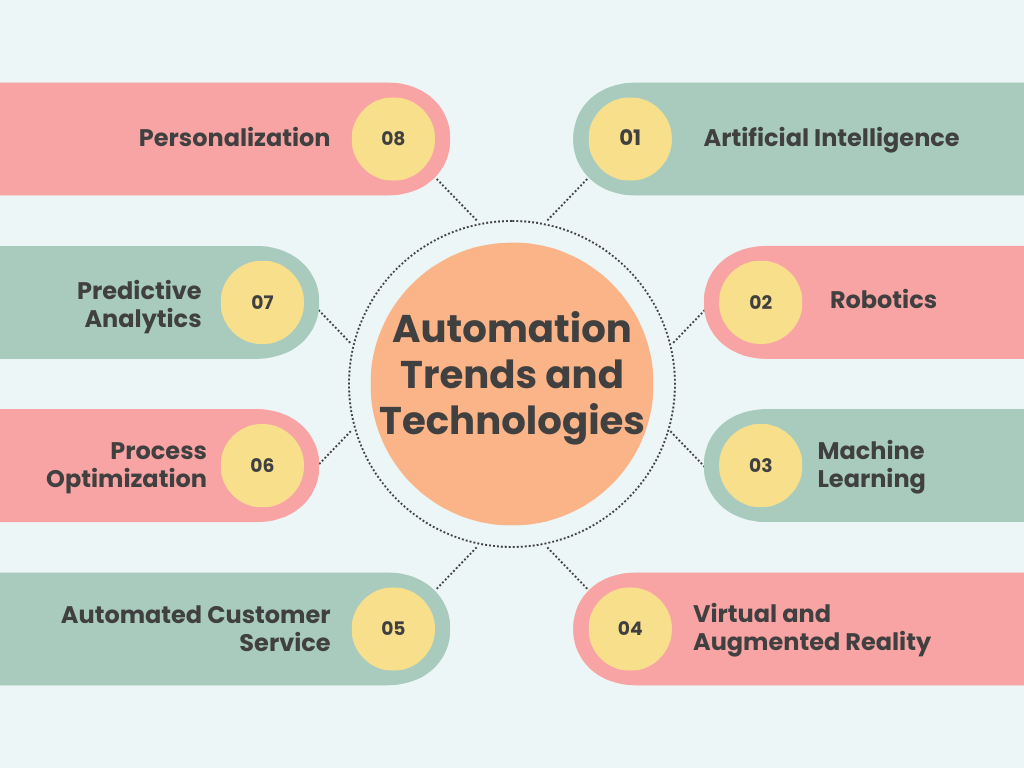
Here are some of the major automation trends and technologies to keep an eye on:
Artificial Intelligence
AI makes it possible for machines to learn from experience, adjust to new inputs, and perform human-like tasks like recognizing speech, identifying images, or making decisions.
AI powers technologies like virtual assistants, self-driving cars, automated stock trading systems, and more.
As AI continues to become more sophisticated, it will significantly transform industries like transportation, healthcare, education, and customer service.
Robotics
Robots are physical machines that automate manual labor and processes.
Robotics are revolutionizing manufacturing, with robots handling repetitive and dangerous tasks with high speed and precision.
Robotic process automation (RPA) uses software to automate repetitive digital tasks like data entry, accounting, and customer service.
Robotics will continue to expand into new areas like exoskeletons, autonomous vehicles, surgical robots, and collaborative robots that work alongside humans.
Machine Learning
Machine learning is a branch of AI focused on teaching computers to learn on their own by using data to make predictions or decisions without being explicitly programmed.
Machine learning powers technologies like facial recognition, personalized recommendations on sites like Netflix and Amazon, and self-driving cars.
As more data becomes available, machine learning will enable even more intelligent and human-like automated systems.
Virtual and Augmented Reality
Virtual and augmented reality immerse users in an interactive digital experience.
VR replaces the real world with a simulated environment while AR overlays digital objects onto the real world.
These technologies are transforming industries like retail, education, healthcare, and entertainment.
As VR and AR become more advanced, they will enable highly engaging and personalized user experiences with AI and automation.
Automated customer service
Many companies will implement AI chatbots and voice assistants to handle basic customer service queries and tasks.
Solutions like Sanka provide automated customer service software that can respond to FAQs, process returns or refunds, and more.
This frees up human customer service reps to handle more complex issues.
Process optimization
Businesses will continue finding ways to optimize processes through automation.
Things like automated data entry, invoice processing, and payroll will become more common.
Automated process optimization reduces costs, improves efficiency, and minimizes human error.
Predictive analytics
AI and machine learning will be used more for predictive analytics to identify opportunities and risks.
Things like predictive inventory management, fraud detection, and sales forecasting will rely on automated predictive models.
This data-driven approach helps with strategic decision-making.
Personalization
Automated personalization uses data to tailor experiences to individual users.
Recommendation engines, targeted messaging, and personalized product suggestions will become more sophisticated.
Personalization leads to better customer experiences, engagement, and loyalty.
How Sanka Helps Businesses Automate Key Processes
Sanka's automation solutions are designed to streamline key processes for your business so you can focus on growth. Their tools help automate repetitive tasks, reduce errors, and boost productivity.
Seamless Integrations
Sanka integrates with many of the tools you already use, like Slack, Gmail, LinkedIn, and more. This makes it easy to set up automation across your tech stack. No complicated coding is required.
Productivity Boost
By automating repetitive tasks like data entry, email responses, and calendar management, your team can spend less time on mundane work and more time on high-impact projects.
Studies show employees waste up to 60% of their workday on low-value tasks—automation helps fix that.
Reduced Errors
Humans make mistakes. Automation reduces human error by handling routine tasks with a high degree of accuracy and consistency.
Things like automatically entering customer data into your CRM when they fill out a form on your website or sending a follow-up email sequence with the right content and on the right schedule.
Scalability
As your business grows, your processes get more complex and difficult to manage manually.
Sanka's flexible automation scale with you, handling higher volumes and more advanced workflows over time.
You'll be able to onboard more customers and employees without a proportional increase in workload.
24/7 Productivity
While your team goes home at the end of the day, Sanka automation keeps working.
Things like monitoring your website for new contact form submissions, posting to social media on a schedule, and tracking campaign performance—all running automatically in the background 24 hours a day, 7 days a week.
Sanka provides an easy way for companies to start automating key processes and gain the benefits of improved productivity, reduced costs, and faster growth.
Conclusion
So there you have it. Automation is clearly the future of business, and adopting it sooner rather than later will put you ahead of the curve.
The benefits to your bottom line, efficiency, productivity, and ability to scale are enormous.
With powerful automation platforms out there like Sanka, implementing customized solutions is easier than ever.
What are you waiting for? Embrace the future, automate your workflows, streamline your processes, and watch your business transform before your eyes.
The tools are there, the trends are clear. Automation is the key to success, and the future is automated.

